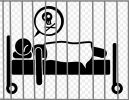 Wikileaks statement: Wikileaks has grave concerns about the state of health of our publisher, Julian Assange, who has been moved to the health ward of Belmarsh prison. Mr Assange's health had already significantly deteriorated after seven years inside the Ecuadorian embassy, under conditions that were incompatible with basic human rights. The United Nations twice found him to have been arbitrarily detained and called on the United Kingdom to honor its committments under international law and free him. The UK's refusal to abide by UN rulings, and its subsequent treatment of Mr. Assange since his arrest, presents serious questions about the UK's standing as a human rights-abiding nation.
Wikileaks statement: Wikileaks has grave concerns about the state of health of our publisher, Julian Assange, who has been moved to the health ward of Belmarsh prison. Mr Assange's health had already significantly deteriorated after seven years inside the Ecuadorian embassy, under conditions that were incompatible with basic human rights. The United Nations twice found him to have been arbitrarily detained and called on the United Kingdom to honor its committments under international law and free him. The UK's refusal to abide by UN rulings, and its subsequent treatment of Mr. Assange since his arrest, presents serious questions about the UK's standing as a human rights-abiding nation.
In his last year in the embassy, as the US finalized its extraditions plans, Julian Assange was, at the bequest of US authorities, totally isolated and gagged - a situation designed to make his life as hard as possible.
During the seven weeks in Belmarsh his health has continued to deteriorate and he has dramatically lost weight. The decision of prison authorities to move him to the health ward speaks for itself.
We strongly condemn the refusal by the Swedish court to postpone a hearing on 3rd June on the basis of Mr Assange's health condition. Defense lawyer for Assange, Per Samuelson said that Julian Assange's health state last Friday was such "that it was not possible to conduct a normal conversation with him."
Tomorrow, May 30, there is a formal hearing in Westminster Court on the Extradition request by the Trump administration. The initial U.S. warrant has been expanded to include a life sentence or potential death penalty under the Espionage Act, announced las week in the superceding indictment which disclosed 17 additional charges, bringing the potential sentence to 175 years in prison. The indictments have beenwidely condemned by free press organizations as the most serious attack against publishing activities in modern times - the Trump administration in essence criminalizes the very act of journalism. The indictment utilises the archaic Espionage Act of 1917 to indict a publisher for the first time in history - in an unprecedented escalation of the Trump administration's war on the free press.
Kristinn Hrafnsson, WikiLeaks editor-in-chief:
"Julian's case is of major historic significance. It will be remembered as the worst attack on press freedom in our lifetime. The People need to voice their condemnation; it is their politicians, their courts, their police and their prisons that are being abused in order to leave this black stain on history. Please act now to avert this shame."
Source of this press release from WikiLeaks is https://twitter.com/wikileaks/status/1133847992656715776

Comments
James Sinnamon
Thu, 2019-06-13 00:49
Permalink
Miscarriage of Justice: Why Assange’s Belmarsh Sentence is Wrong
By Nina Cross at 12st Century Wire
Judge Taylor gave Assange effectively a year in Belmarsh Category A prison for skipping bail in 2012. Assange was required to prove he had good reason to skip bail:
Under s. 6(3) of the Bail Act 1976, it is for the defendant to prove that he had a reasonable cause for failing to surrender.
Taylor dismissed Assange’s mitigating reasons for jumping bail, citing the previous judges’ rejection. This is a collective dismissal of what has been a very public aggression towards Assange by the US government and its allies. Examples of threats to Assange, which appeared in his statement, are seen here, here, here and here. The question we must ask in the case of Assange is what type of mitigating proof (threats of assassination, torture and abuse aside) would have stood up in Taylor’s court? Had Assange had a note from Mike Pompeo threatening capital punishment or a life sentence without parole in a high security prison for exposing US war crimes, signed prior to June 2012, would that have got Assange into a B Category prison for 6 months instead?
Taylor dismissed Assange’s fear of persecution by the US, sentencing him to 50 weeks in Belmarsh prison, where his condition, already identified as deteriorating, has worsened to the extent he is now in the prison health ward. Her reason was that Assange had a choice:
“Whilst you may have had fears as to what may happen to you, nonetheless you had a choice…”
This may be technically true. An individual chased by their attacker may have the choice of hiding, if they can, to avoid being attacked; if their attacker hangs around they can choose to come out and risk being hurt or stay out of sight. This ‘choice’ has been presented as an illusion of freedom, and in turn, an illusion of due process.
This reality of the ‘choice’ facing Assange has been summed up by Melzer in a response to Foreign Secretary Jeremy Hunt’s denial of UK abuse on Twitter:
…
Add comment